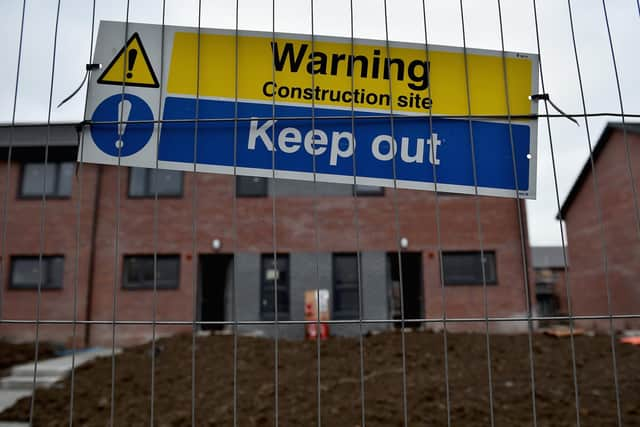Call for more Scots social housing after housebuilding plummeted in 2020
Social housing provider Riverside Scotland has stressed the need for housing associations to deliver more new homes north of the Border – as it cited Scottish Government data showing that the total fell by more than a third year on year from 2019 amid Covid hampering the building industry.
The organisation – a trading name of Irvine Housing Association and part of The Riverside Group – said that according to Holyrood’s latest quarterly statistics, 14,834 new dwellings were added to the national housing stock in 2020, down from 22,673 in the prior year, not only ending three years of increases, but also the lowest figure since 1947.
Advertisement
Hide AdAdvertisement
Hide AdFurthermore, excluding the war years, prior lows came in 1931, at 12,468, and 1930, at 12,464.


Riverside added that housebuilding in Scotland has seen “numerous peaks and troughs” since an initial post-war boom, with the number of completions peaking at 39,548 in 1953. Activity then dropped, slumping to 26,761 in 1962 – “relatively low at the time, but still higher than anything achieved in the 1980s, 1990s, or 21st century”, according to the housing specialist.
It also flagged a second “flurry” in the mid- to late-1960s that saw completions rise as high as 43,126 in 1970, but then activity petered out, and there was then a slow but steady rise until the financial crisis hit in 2008, but in 2012 only 15,053 new homes were completed – a record low at the time.
Riverside added that the social sector appears to have been slightly more buffered than the private sector, with a lower percentage drop in properties completed.
Additionally, Riverside is currently building what it says is Scotland’s largest social modular housing development in Dundonald, Ayrshire, saying the £9.8 million project will provide 63 affordable homes. It is also creating 77 properties at Tarryholme, and 50 at Monkton, both also in the region.
Recovery
Across the UK, it saw a 24 per cent reduction in its own housebuilding in 2020/21 compared to 2019/20, mainly due to the impact of site closures during lockdowns – but it is predicting that 2021 data will show a continuation of the recovery, and it forecasts a bounceback of 95 per cent in 2022, up 48 per cent against 2019 levels.
It also said the data suggests the industry was already rebounding by the end of 2020, with some 5,177 homes completed in the fourth quarter, up from 3,969 in the third, and just 722 in the second three months of the year.
Looking at specific cities, in Aberdeen the number of completions fell by almost half to 572 in 2020. Edinburgh – which is tackling a housing crisis – was down by 37.9 per cent to 2,045, and Glasgow dropped 32.9 per cent to 1,008.
Advertisement
Hide AdAdvertisement
Hide AdRiverside boss Diana MacLean said: “As housebuilding has been disrupted by Covid, it’s even more important that housing associations fulfil their ambitions to deliver more new homes across Scotland.
“While a global health emergency has understandably played a role in denting housebuilding, we are heavily focused on our role to help the Scottish Government deliver more much-needed affordable housing.”
A message from the Editor:
Thank you for reading this article. We're more reliant on your support than ever as the shift in consumer habits brought about by coronavirus impacts our advertisers.
If you haven't already, please consider supporting our trusted, fact-checked journalism by taking out a digital subscription.
Comments
Want to join the conversation? Please or to comment on this article.
